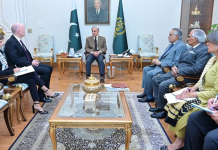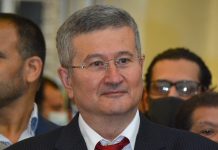DR CYRILL NUNN
Ansar Mahmood Bhatti
Dr. Cyrill Nunn is a career diplomat. He got his early school education in Lyon and Brussels while he studied economics sciences and history in his native town Dusseldorf. He joined German air force in 1984 and in 1985 he joined Foreign Service academy. He has served on a number of important diplomatic positions. Before arriving in Pakistan as an ambassador Dr. Nunn was serving as Director General Asian and Pacific Affairs at the Federal Foreign Office. He gave an exclusive interview to Centreline and DNA. Here are excerpts from his interview for the interest of readers.
Let us begin with the development cooperation between the two countries. Can you share with our readers some of the salient features of this cooperation?
Germany and Pakistan enjoy cordial relations in all fields including trade, economy, politics and culture. As you know the Speaker of German parliament was here in Pakistan recently, who is No 2 in German hierarchy. The Speaker’s visit ostensibly contributed greatly towards further strengthening of friendly relations between the two friendly countries.
Development cooperation between Pakistan and Germany goes back to 1961, with the funding volume to date totalling some 2.5 billion euros. Pakistan was thus one of Germany’s first partner countries. The regional focus of this cooperation has traditionally been the north-western part of the country. Germany is one of the few donors to have its own implementing structures. It is active in Khyber-Pakhtunkhwa Province (KP) and is one of only a few of Pakistan’s partners to be implementing measures in the Federally Administered Tribal Areas (FATA) along the border with Afghanistan.
A large number of Pakistanis travel to Germany on regular basis. In order to facilitate these people we have active consulates that are providing adequate assistance to the visa seekers. Likewise our mutual cooperation in military field has also increased. Pakistani military officials go to Germany for training on regular basis while visit of German military officials to Pakistan is also a regular feature of military relations between Germany and Pakistan.
Would you like to highlight efforts that your embassy has made to further strengthen trade and economic links between Germany and Pakistan?
As first step we try to motivate business delegations from Pakistan to Germany. Pakistani businessmen under the leadership of Punjab Chief Minister Shahbaz Sharif visited Germany recently in order to explore various business opportunities. On 23 September we are planning a conference in Berlin so as to provide businessmen of both countries with an opportunity to meet one another and talk business. We are working hard to bring German business people to Pakistan and I hope we shall be able to materialize this initiative either in the second half of this year or the first half of next year.
We should not forget that there are a number of business people on both sides who are interacting with one another on individual basis. I am pleased to share with you that these interactions have increased manifold.
Security issues by and large are the main hurdles in the way of foreign investments in Pakistan. Do you share this perception and how optimistic you are that things will get better, in terms of security, in the coming days?
Improved security situation of course can help fetch more and more foreign investments. It is encouraging to know that the incumbent government accords top priority to improving the security situation and Germany fully supports governments all moves in this direction. Foreign investors including the Germans would naturally first look at the security situation before coming here for business purposes. We are very well aware of the government efforts that it has been making to engage with various elements in order to ensure conducive business environment and fully support these efforts because we believe, that is the way to promote foreign investments.
Pakistan has got GSP plus status recently. How do you see this development or achievement, and what, in your view, is required of the Pakistan government and private sector, to make optimum use of this facility?
GSP plus, as you know, means reduction of duties on Pakistani products to be exported to 28 member counties of European Union. Since these products will have fewer duties therefore shall be available on cheaper rates to consumers. GSP plus apart from textile sector shall also cover other sectors such as leather goods and agriculture. It is something very important because it shows commitment on our part as Europeans to help Pakistan’s business sector where ever we can and secondly it shows that there is a sizeable demand for Pakistani products in Europe. You might know that the Pakistani textile industry was exporting until last year 700 million USD textile products to Germany alone. Now with GSP plus in place these exports are likely to get a considerable boost. So it is a win-win situation for both sides because we in Europe would get various Pakistani products at cheaper rates while on the other hand Pakistani exports would increase manifold.
As we know, quite a few German NGOs are working in Pakistan. How would you comment on the role of these NGOs in bringing people of both countries closer?
The presence of big number of German NGOs in Pakistan unequivocally shows Germany’s commitment to be partner in Pakistan’s development. These NGOs are here because there is a feeling that Pakistan needs help. It needs help when it is hit by hard blows like floods or earthquakes. Pakistan is a disaster prone country hence needs a lending hand. These NGOs do not get money from government. They generate their funds on their own.
Culture and education is yet another field where both countries have been working hand in hand. Can you tell us some details of cooperation in these particular fields?
I have some good news to share with you in this regard. It is encouraging to note that a lot of Pakistani students have discovered Germany as their preferred destination for higher studies. Germany some time ago was not the first destination of Pakistani students because they had to learn German language before undertaking their studies. However situation has changed now. We have now many institutions that are imparting education in English as well. We have here now a full fledge office providing assistance regarding higher studies in Germany and secondly we are working in close contact with the High Education Commission of Pakistan in this regard. Let me tell you that education is free in Germany, even for those Pakistani students who get admissions in German institutions. We prefer to have those students who cannot afford studies abroad.
We have a cultural center in Karachi while in Lahore we have a common German-French culture center. Both these centers have been contributing greatly towards further strengthening cultural ties between the two countries.
Apart from education and culture, we do have a scope to deepen our sporting relations. Germany and Pakistan happen to be the best hockey teams in the world, though Pakistan team these days is facing some problems, but one should hope that Pakistan team would soon come out of this difficult phase. Being himself a hockey player and a keen admirer of the game, I think both countries can engage in friendly series. I am looking forward to meeting with the Pakistan Hockey Federation officials in order to discuss a hockey series between Germany and Pakistan.
Your impressions about Pakistan?
We feel at ease in Islamabad. Everything is in order here. No traffic jams; no pollution; green mountains and what not. Let me tell you honestly that people in this country are very friendly, caring and nice. I sometimes wish that this friendliness reverberates also in the way Pakistanis are treating each other.











